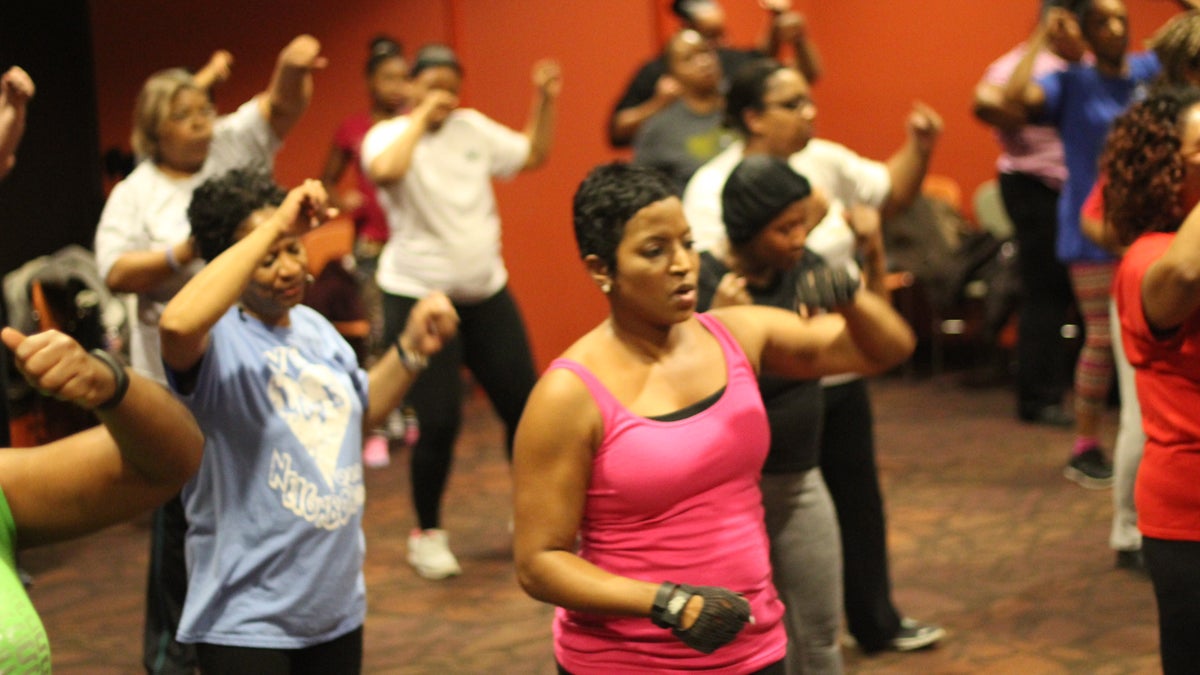At one Kansas City library, residents check out their health
Listen
Fitness instructor Nicki Jones leads an exercise class at Lucile H. Bluford Library in Kansas City. (Calvin Jones/for WHYY)
We think of libraries as places we can exercise our minds…but in an increasingly digitized world, they public spaces make pretty good gyms.
This piece is part of our “Rebirth Of The Library” show. Take a look at the rest of our stories here.
On Tuesday evenings, the hush of the Lucile H. Bluford Library on Kansas City’s east side is transformed by the boom of Hip Hop and R&B. The center’s small conference room is filled with about 40 people—mostly middle-aged women, and a few men, all wearing spandex and sneakers. Fitness instructor Nicki Jones stands at the front of the room, braids pulled back and wearing a sports blazer. She shouts over the music to lead the crowd through a set of squats, bicep curls and lunges.
Jones says a lot of students find out about the free classes when they come to the Bluford Library for other resources, like to checkout a book or a DVD. Some, like longtime student Elena Reed, say the convenience of the classes keeps her coming back.
“It’s in my community, so I can walk here, you know,” She says.
Not only is the library on a bus line, but people who have kids, like Reed, can leave to workout while their kids read a book or use the computers in the other room. It’s been four years since Jones began teaching these fitness classes at Bluford, and in that time they’ve become so popular that Jones says, they’ve had to add more classes to avoid turning people away.
“I’m talking about working folks,” Jones says. “I’m watching ladies get out of their car, run to the bathroom to change into their workout clothes and hit this room for a workout.”
This community on Kansas City’s east side is nearly 80 percent African American, and almost 40 percent of those resident live in poverty. Many don’t have the disposable income for a gym membership, and Jones says the high crime rate can make finding a safe space to workout a challenge
They say, ‘Oh just go for a walk,'” says Jones.” But there are some communities that you shouldn’t be walking in and this is one of them.”
For Jones, teaching fitness has nothing to do with vanity. As someone who didn’t grow up in a household that fostered a healthy lifestyle, Jones says that learning to exercise as an adult has completely transformed her life both physically and mentally. She hopes it can do the same thing for the residents in one of Kansas City’s more disadvantaged neighborhoods.
“This resource is dire to my community,” says Jones. “It’s because of the health disparity, the hypertension, the diabetes, heart disease. The chronic three.”
Heart disease, which is often caused by diabetes and obesity, is the number one cause of death in this county at 25 percent. April Roy, who has been the director at the Bluford Library for the past three years, says that health disparity is what drove her to develop new programing for the center.
“When I first started working here,” says Roy. “I was looking at The Call, which is our African American newspaper here in Kansas City, and I was looking at the obituary section, and I just kept seeing these people dead…in their fifties over and over again.”
Roy says, that like a lot of libraries, Bluford is evolving from being just a “book warehouse” to providing the resources that serve their community, and their focus is health. Bluford has partnered with Truman Medical Center and the American Heart Association to offer classes in chronic disease management and health fairs, as well as information on nutrition, medicaid and free healthcare services.
Roy admits that, at times working at Bluford Library can be a bit overwhelming, especially when you consider the many challenges this community faces. She says focusing on healthcare helps put things into perspective.
“It’s sort of the same things we teach in the chronic disease self management class,” says Roy. “I apply that to our entire community, to say, ‘Well this little problem we can fix, and this little problem we can fix…and maybe fixing those little things can add up to bigger change.'”
In the meantime, Roy and Jones will continue confronting local disparities to discover the potential for service one workout at a time.
WHYY is your source for fact-based, in-depth journalism and information. As a nonprofit organization, we rely on financial support from readers like you. Please give today.



